Trauma: causes, symptoms, effects, and treatments
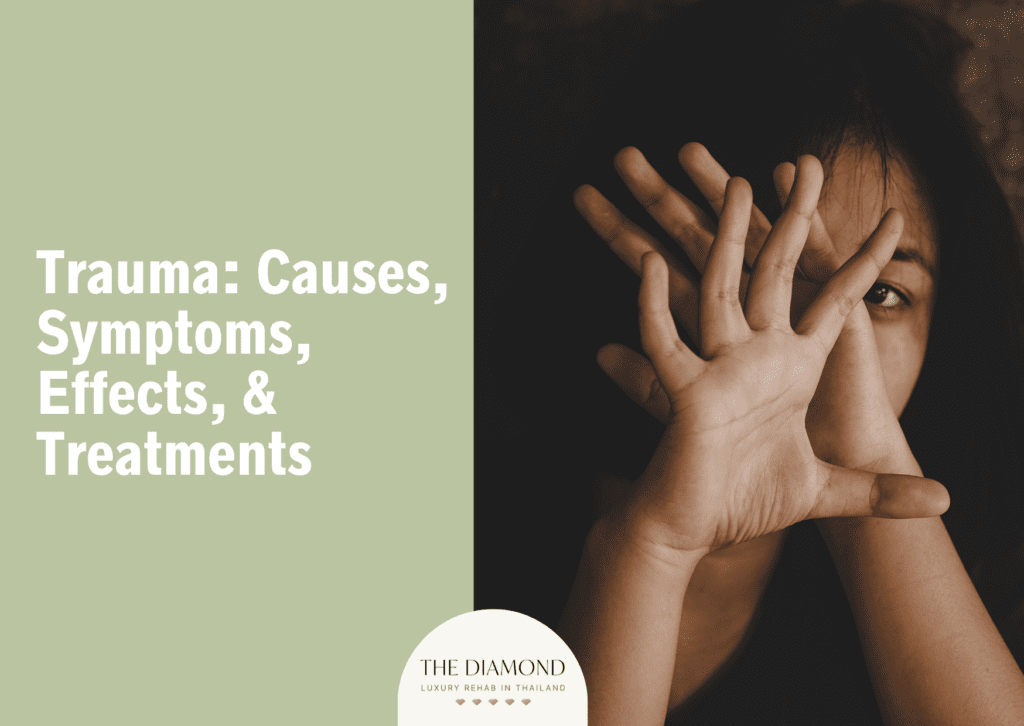
Trauma refers to the psychological harm that results from going through deeply distressing or disturbing events. What’s traumatic to someone may be personal, and therefore triggers may vary from person to person.
The most common causes of trauma include a history of emotional or verbal abuse, childhood neglect, physical assault, military conflict, sexual violence, a life-threatening medical condition, and racial threats.
The physical symptoms of trauma include sleep disruptions, poor concentration, fatigue, nausea, dizziness, and gastrointestinal problems. Emotional signs include anger, denial, fear, sadness, shame, and confusion.
Trauma has adverse effects on one’s physical and mental health, including insomnia or nightmares, racing heartbeat, emotional outbursts, flashbacks, panic attacks, dissociation, alcohol and substance misuse, and suicidal feelings.
Treatment options for trauma include cognitive behavioral therapy (CBT), eye movement desensitization and reprocessing (EMDR), somatic therapies, and medications.
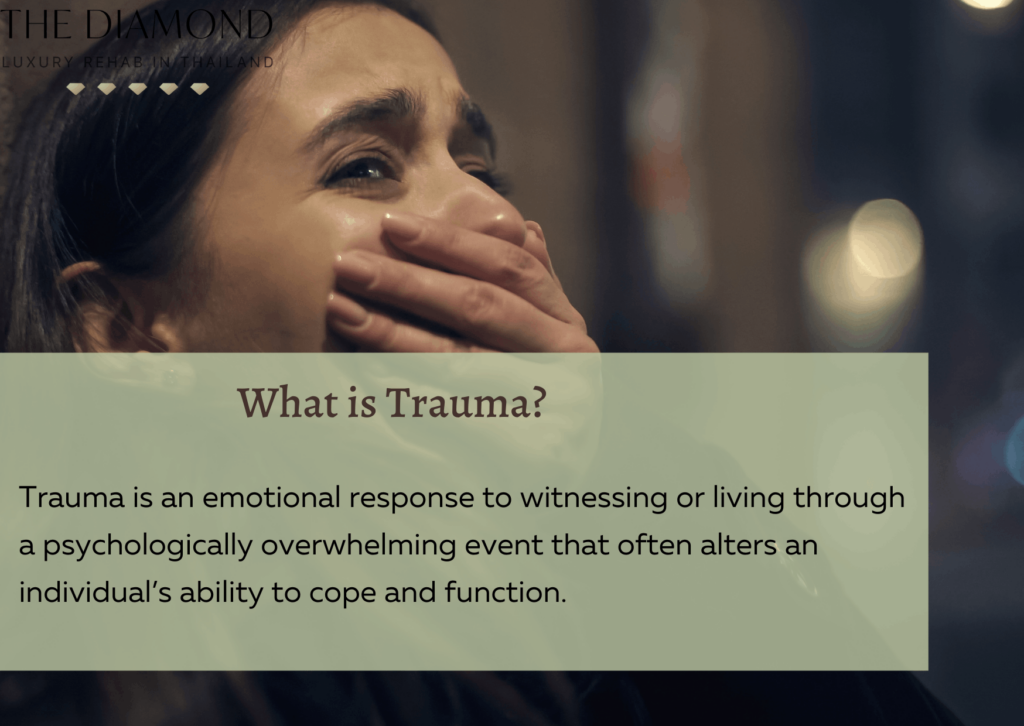
What is Trauma?
Trauma is an emotional response to witnessing or living through a psychologically overwhelming event that often alters an individual’s ability to cope and function. Any situation that leaves you struggling with upsetting emotions and shatters your sense of security can result in traumatic stress.
Trauma treatment aims to decrease the effects of the terrifying experience and helps you deal with the physical and emotional responses caused by the traumatic event.
How common is Trauma?
Experiencing trauma is actually very common. Statistics indicate that around 6 out of 10 men and 5 of every 10 women go through at least one trauma in their lifetime. Furthermore, findings from a World Mental Health Survey, an initiative by the World Health Organization (WHO), found that about a third of more than 125,000 people surveyed from 24 different countries had been through a traumatic experience.
What are the causes of Trauma?
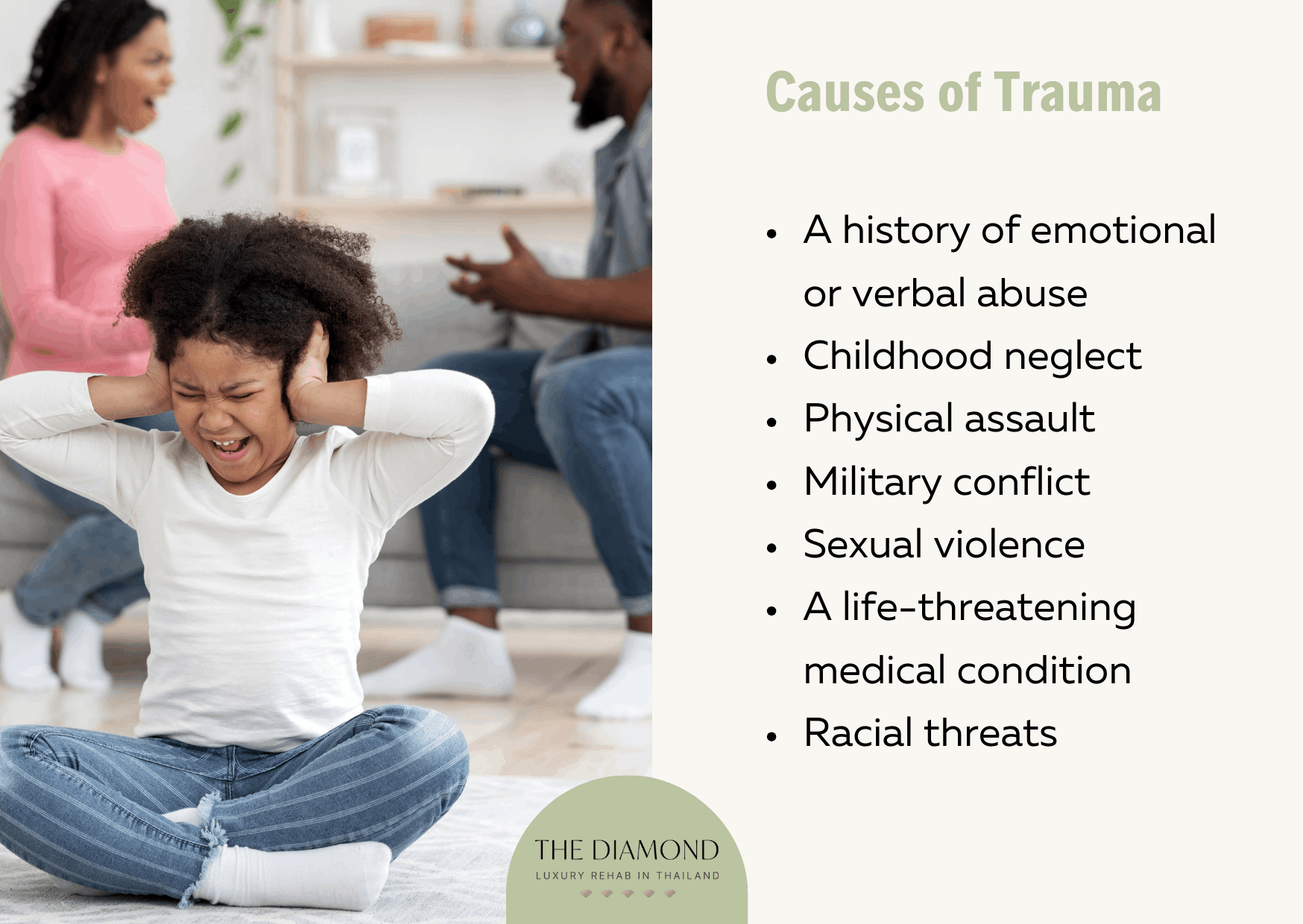
Trauma is associated with exposure to stressful events that cause disability in daily functioning. The most common causes of trauma are listed below.
- A history of emotional or verbal abuse: Trauma can originate from emotional or verbal abuse, which may include attempts to control you, calling you insulting names, humiliating you in front of others, and attempts to scare or threaten you. Being emotionally or verbally abused can have lasting effects on mental health, causing you to question your reality and develop trauma from the distressing experience.
- Childhood neglect: Being emotionally neglected as a child can be a traumatic experience. Childhood emotional neglect happens when parents fail to appropriately respond to their child’s emotions as they grow up. It is also referred to as childhood trauma and can affect a child’s sense of self and their ability to build healthy relationships later in life.
- Physical assault: Injuries inflicted by physical assaults from strangers, peers, or even caregivers may be physically visible, but these injuries are often accompanied by an often-hidden emotional trauma. What’s worse is that this can linger on for a long period of time, making victims fear that the world is no longer safe for them.
- Military conflict: A large percentage of former combatants typically suffer from trauma and various other mental health issues due to overexposure to traumatic stressors during war and armed conflicts. According to a study published in the Spanish journal Anuario de Psicología Jurídica (Annual Review of Legal Psychology), the quality of life of armed conflict victims typically remains low even after peace agreements have been reached.
- Sexual violence: Survivors of sexual violence can face extremely difficult emotions due to flashbacks of their past trauma. Individuals who have been sexually assaulted have an increased likelihood of experiencing signs of post-traumatic stress disorder, including nightmares and unwanted intrusive thoughts.
- A life-threatening medical condition: Emotional and physical responses that occur after being diagnosed with or surviving a serious illness, injury, or pain as well as experiencing frightening medical procedures is called medical trauma. These negative experiences within the medical setting can leave people becoming reluctant to get medical care.
- Racial threats: Experiencing racism firsthand and being exposed to racial discrimination and violence in the media can cause racial trauma, also known as race-based traumatic stress (RBTS). This exposure to racism can cause significant fear and stress linked to the development of depression.
What are the symptoms of Trauma?
Trauma may manifest in both physical and emotional ways. The symptoms of trauma are listed below.
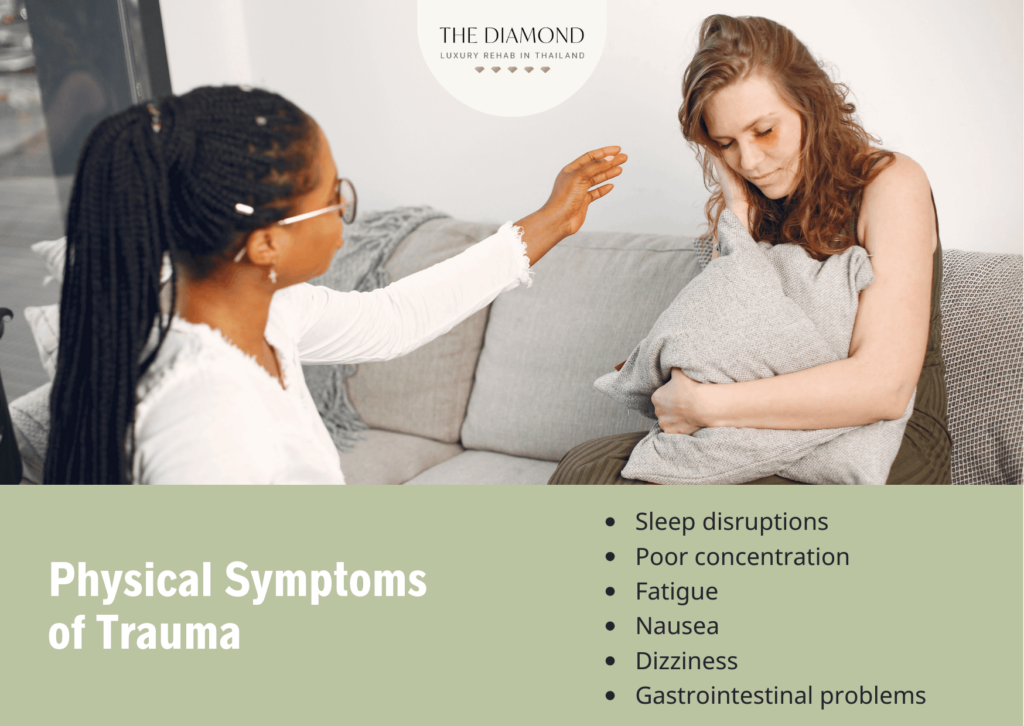
Physical Symptoms
- Sleep disruptions: Sleep problems often co-occur with trauma, with insomnia being one of the most common sleep issues experienced by trauma survivors. More severe sleep disorders are frequently seen in people who suffer from post-traumatic stress disorder (PTSD).
- Poor concentration: Difficulties with concentration can occur due to unprocessed trauma. Issues with memory and concentration often go hand in hand with trauma survivors because their brains are constantly in a state of hypervigilance, which tends to suppress their memory.
- Fatigue: Prolonged exposure to traumatic life events can easily tire anyone out and make them feel emotionally and physically drained. This can eventually lead to chronic fatigue, which is a burnout response that can persist despite efforts to reduce life stressors.
- Nausea: According to the American Psychological Association, longer-term reactions to traumatic experiences can trigger physical symptoms, such as nausea. Nausea is one way the body reacts to fear, which can lead to a cascade of negative emotions and physical distress.
- Dizziness: Frightening situations that trigger the body’s fight or flight response can contribute to the dysfunction of the vestibular system, which provides us with a sense of balance and motion. Disturbances to this system can result in dizziness or vertigo.
- Gastrointestinal problems: Studies have long established a strong connection between the gut and the brain. In fact, a study published in The American Journal of Gastroenterology states that people who have experienced trauma or abuse are more likely to develop irritable bowel syndrome (IBS), as well as other gastrointestinal symptoms.
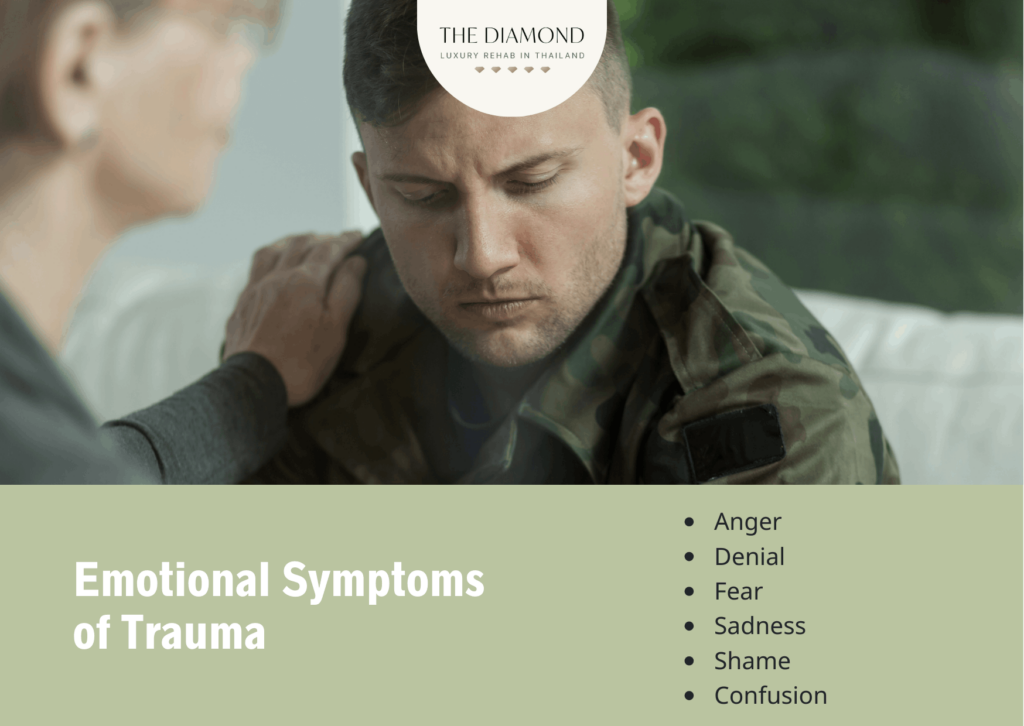
Emotional Symptoms
- Anger: People who tend to suppress their traumatic experience often find themselves constantly feeling on edge and feeling angry or upset at what happened to them. Anger can also be more intense following a psychologically overwhelming event. But even though it can feel scary, anger is an important stage of trauma recovery and is a natural part of recovering from it.
- Denial: Trauma denial is a form of defense mechanism that allows a survivor to put a distance between themselves and their traumatic experience. It is one of the many ways the mind tries to adapt by blocking painful feelings to avoid dealing with them.
- Fear: A traumatic event causes your body’s natural equilibrium to disrupt, sending you into a state of hyperarousal and fear. While what is considered trauma may naturally cause a fear reaction, severe trauma can cause full-blown phobias to develop, especially when left untreated.
- Sadness: It is normal to have feelings of sadness after a distressing or frightening event. However, severe traumatic events can make people feel a sense of helplessness that can lead to the development of depression, which is characterized by persistent feelings of sadness and emptiness.
- Shame: Past adverse experiences are known to create feelings of shame that can develop over time. Shame in the face of trauma makes sufferers blame themselves for the trauma they have gone through. Experiencing shame following a traumatic event can lead individuals to develop unhealthy coping strategies, such as self-destructive behaviors, which can further hinder their ability to process the emotions triggered by their trauma.
- Confusion: It is one of the most common initial responses to trauma. A disturbing event often leaves a survivor feeling detached and confused, finding it difficult to believe what happened to them.
What are the possible effects of Trauma?
The impacts of trauma can also manifest physically and psychologically. The possible effects of trauma are listed below.
Physical Effects
- Insomnia or nightmares: Research has increasingly recognized traumatic events as a major risk factor for clinically significant insomnia. Trauma that results from terrifying experiences gives rise to a neurobiological response that triggers the onset of insomnia.
- Racing heartbeat: Repeated and vivid memories of a terrifying event may occur for no reason and may cause physical trauma symptoms, such as a racing heartbeat or sweating.
- Edginess and agitation: Edginess associated with trauma can manifest as irritability and may also cause physical symptoms, such as trembling, restlessness, or shaking. Agitation, on the other hand, is an initial reaction to trauma that involves feelings of aggravation or annoyance and can be triggered by memories of the unfortunate incident.
- Being easily startled: An exaggerated startle response is considered a consequence of early trauma exposure during childhood. People with trauma often startle easily because the nervous system gets overwhelmed by the terrifying experience.
- Aches and pains: Our mind and body can influence each other in various ways. While trauma and unresolved emotional issues may not directly cause chronic pain, it certainly ups the risk of developing the condition. Extreme stress can contribute to and exacerbate pain, causing muscle tension and inflammation.
Psychological Effects
- Emotional outbursts: The trauma and shock caused by early childhood abuse can cause emotional dysregulation later in life, which can lead to frequent emotional outbursts. These outbursts may also be redirected to family members or friends and this is one of the reasons why trauma can be hard to handle for loved ones as well.
- Flashbacks: Trauma survivors often experience emotional flashbacks, which can be different from a PTSD flashback. Emotional flashbacks are intense emotions that come rushing through waves and can be triggered by a totally mismatched present experience. For instance, someone who received feedback from a boss about areas they could improve may come back to their table with trembling hands, not because of their interaction with their boss, but because they are having the emotional experience of getting in trouble while living in an abusive home.
- Panic attacks: is a form of fear response that comes on suddenly. Panic attacks may occur when a triggering event reminds you of your trauma, and they may also come without warning or without any reason.
- Dissociation: Trauma-related dissociation can be described as a form of mental escape from overwhelming emotions and stress. Survivors may feel like they are detached from their bodies or spaced out, and may feel like they are ‘switching off.’ Dissociation is an emotional response to a traumatic event that is often uncontrollable for many people.
- Alcohol and substance misuse: Experiencing trauma may cause someone to develop unhealthy coping strategies, such as alcoholism and drug abuse, in order to cope with negative emotions.
- Suicidal feelings: Suicide risk is higher in trauma survivors because they tend to cope with difficult emotions by not expressing their feelings. As a result, they may struggle to handle emotional pain and turn to suicide as a last resort.
What are the other types of Trauma?
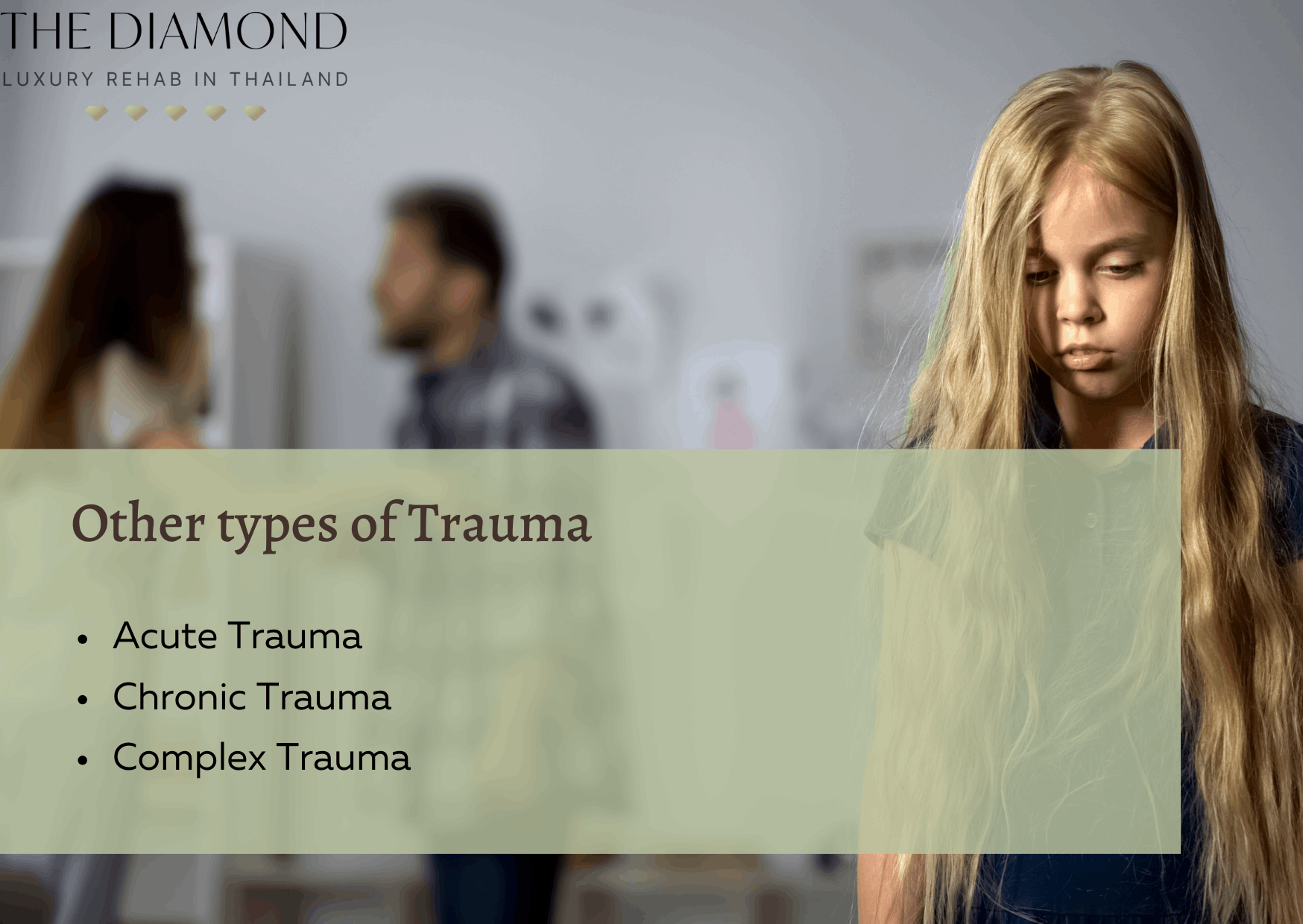
Trauma affects everyone differently – even those who have gone through the same distressing event. But certain categories for trauma exist, which can help you make sense of what you have experienced. The other types of trauma are demonstrated in the table below.
1. Acute Trauma
Definition: Acute trauma refers to trauma that develops after a single dangerous event that is typically brief. Some examples include car accidents, theft, or assault.
Signs: Increased irritability, confusion, behavioral changes, poor grooming habits, lack of focus at work or school, insomnia, and other sleep problems.
Causes: A singular overwhelming incident, such as robbery, loss of a pet, assault, and sudden death of a loved one.
Effects: Confusion, numbness, dissociation, exhaustion, blunted affect, and agitation.
2. Chronic Trauma
Definition: Chronic trauma occurs when an individual has repeated and prolonged exposure to traumatic situations
Signs: Feelings of shame, guilt, relationship difficulties, emotional dysregulation, and difficulty connecting with people.
Causes: Prolonged child abuse, ongoing sexual abuse, war or combat situations, and witnessing the abuse of a parent or family member.
Effects: Development of complex PTSD, changes in beliefs and worldview, relationship issues, and detachment from the traumatic event.
3. Complex Trauma
Definition: Complex trauma refers to children’s exposure to a series of traumatic events that happen over an extended period of time
Signs: Complex trauma meaning can also involve the symptoms of PTSD, including dissociative episodes, hopelessness or despair, and difficulty trusting people or being intimate.
Causes: Incidents that can cause complex trauma to develop are sexual abuse or incest, profound neglect, ongoing physical or emotional abuse, medical trauma, being held captive, and a child being forced to take on the role of a parent.
Effects: Anger, anxiety, lack of trust, depression, poor decision-making skills, and difficulty identifying, expressing, and managing emotions.
How long does a Trauma last?
Trauma usually lasts between a few weeks to a few months before people start to ease back into their normal lives again. Most people feel better within three months following a traumatic event.
However, if emotional difficulties associated with the trauma become worse or persist for many weeks or months after the incident, your symptoms may already be indicative of post-traumatic stress disorder (PTSD), according to the Mayo Clinic. PTSD that goes untreated can last for years or even until the remainder of your life.
What are the available treatments for Trauma?
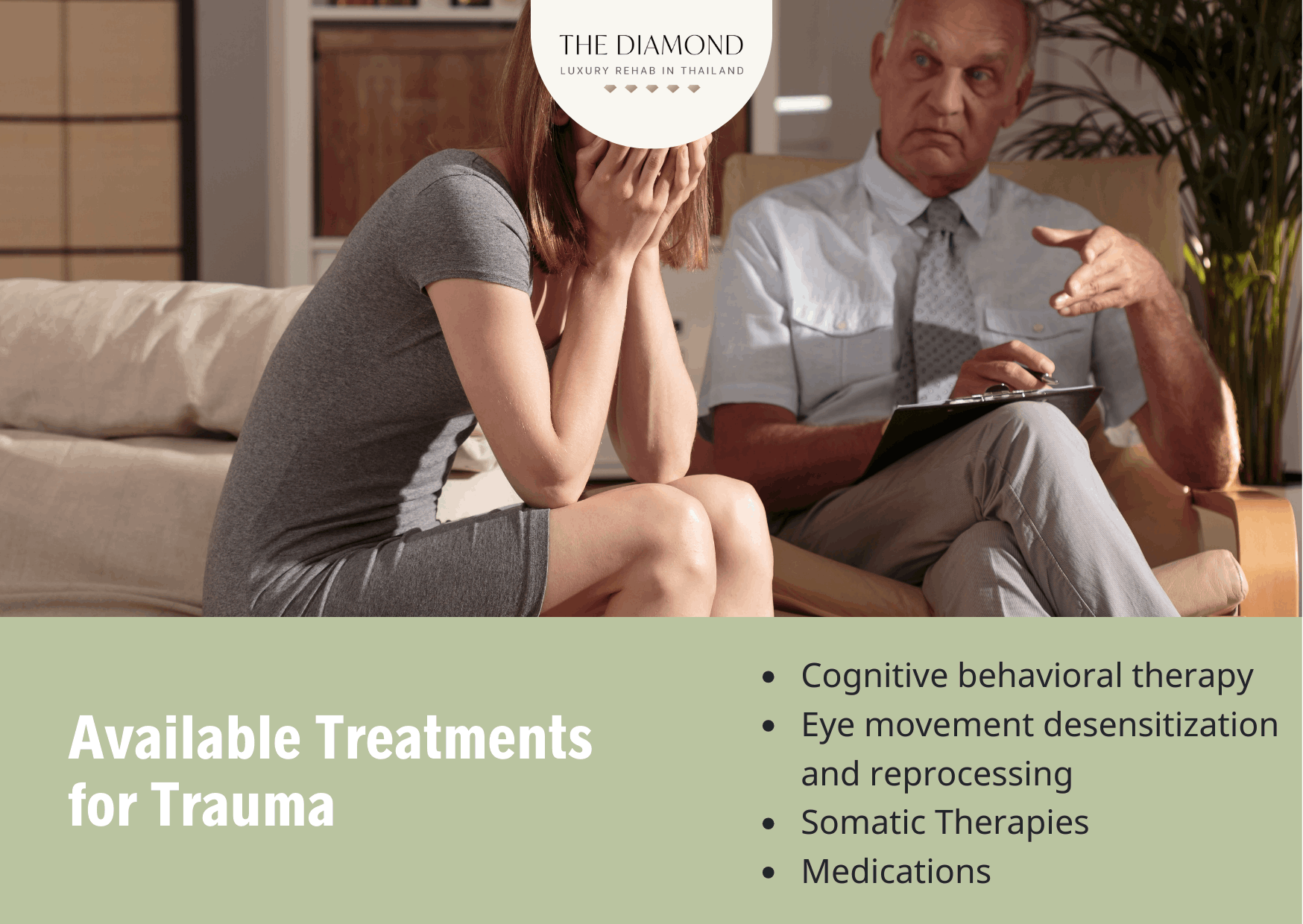
People experiencing trauma will benefit from a treatment plan that is specifically tailored to their symptoms and medical needs. The available treatments for trauma are listed below.
1. Cognitive behavioral therapy
One of the most effective methods for treating trauma is the use of cognitive behavioral therapy (CBT). CBT is a type of talking therapy that helps survivors identify how their traumatic experiences may have influenced their thoughts and behaviors. Trauma-focused CBT helps target the negative thoughts and feelings associated with the traumatic experience to decrease distress in the face of trauma-related triggers.
2. Eye movement desensitization and reprocessing
Eye movement desensitization and reprocessing, or EMDR therapy, is a treatment method that involves a mental health professional directing your eye movements in a specific direction while you recall a traumatic event. This eye movement allows the trauma sufferer to gain a new perspective on their situation, so they can process disturbing memories and associated symptoms on an emotional level, where a sense of strength replaces fear or anger due to chronic or acute trauma.
3. Somatic Therapies
Somatic therapies are body-centered approaches to treating the symptoms of trauma and other various mental health issues through the release of tension and trauma from the body. Somatic or body-based techniques include somatic experiencing, sensorimotor psychotherapy, acupoint stimulation, and touch therapies. This treatment approach combines both psychotherapy and physical therapies, such as meditation, dance, and breath work for holistic healing.
4. Medications
Although medications cannot replace psychological support as the most important treatment for trauma, they can be a valuable addition in certain cases. Some medications that have been proven to work for trauma are Sertraline (Zoloft), Paroxetine (Paxil), Fluoxetine (Prozac), and Venlafaxine (Effexor). A report from the National Library of Medicine stated that scientific guidelines recommend not to use medicines only, as they alone cannot cure trauma. However, they can help with the temporary or long-term relief of symptoms, such as sleep disturbances, panic attacks, anxiety, and depression.

